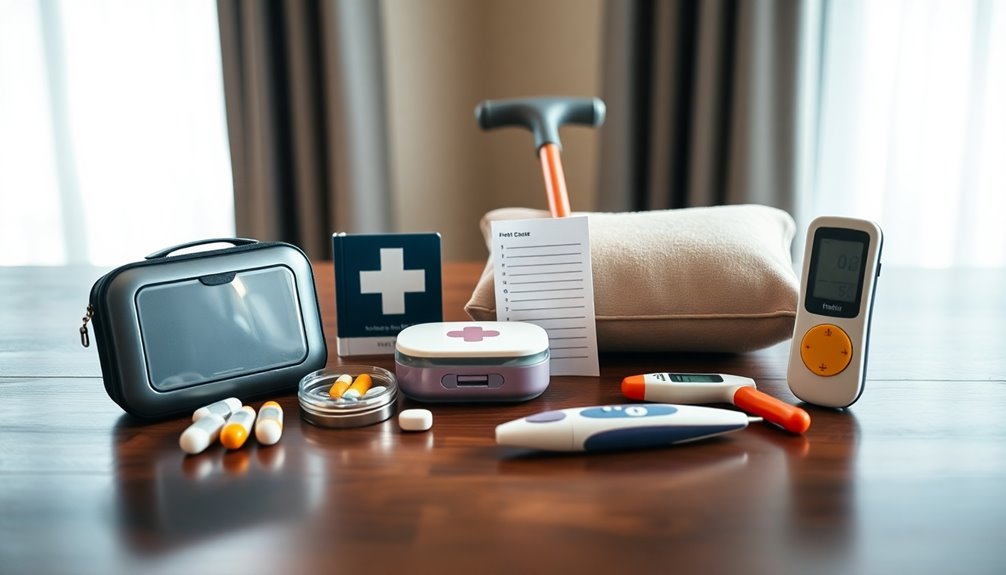You won't believe how essential these caregiving tools can be! A caregiver journal keeps all your medical notes organized. Comfortable, non-slip footwear helps you stay steady on your feet while protective gear guarantees safety and hygiene. A back support belt reduces strain during lifting. Stock a first aid kit for quick response to injuries. Don't forget personal health items like hand sanitizers, and cultivate your support network. Discover even more helpful tools to make your caregiving experience smoother!
Key Takeaways
- A caregiver journal or organizer streamlines medical information and daily tasks, enhancing communication with healthcare providers.
- Telehealth services provide convenient access to medical professionals, reducing travel time and increasing patient satisfaction.
- Ergonomic tools like back support belts and comfortable footwear prevent injuries and improve caregiver well-being during long shifts.
- Protective gear, including gloves and masks, ensures hygiene and safety while minimizing infection risks for both caregivers and individuals in care.
- Health tracking apps and wearable devices offer real-time insights into vital signs, helping caregivers monitor and adjust care plans effectively.
Caregiver Journal or Organizer

While caregiving can be overwhelming, using a caregiver journal or organizer can make a significant difference in your daily routine. This essential tool serves as a central repository for medical information, appointments, and daily care activities, helping you stay organized and informed.
By regularly documenting health progress and changes in condition, you can recognize patterns and communicate effectively with healthcare providers. A caregiver journal streamlines your process, making it easier to track treatments, medications, and crucial statistics.
Plus, keeping an emergency contact list enhances safety, allowing quick access to important contacts. Utilizing a caregiver organizer reduces stress and increases efficiency, providing the structure and reminders you need to manage your caregiving responsibilities effectively. Additionally, understanding filial responsibility laws can help you navigate potential financial obligations while providing care.
Comfortable, Non-Slip Footwear
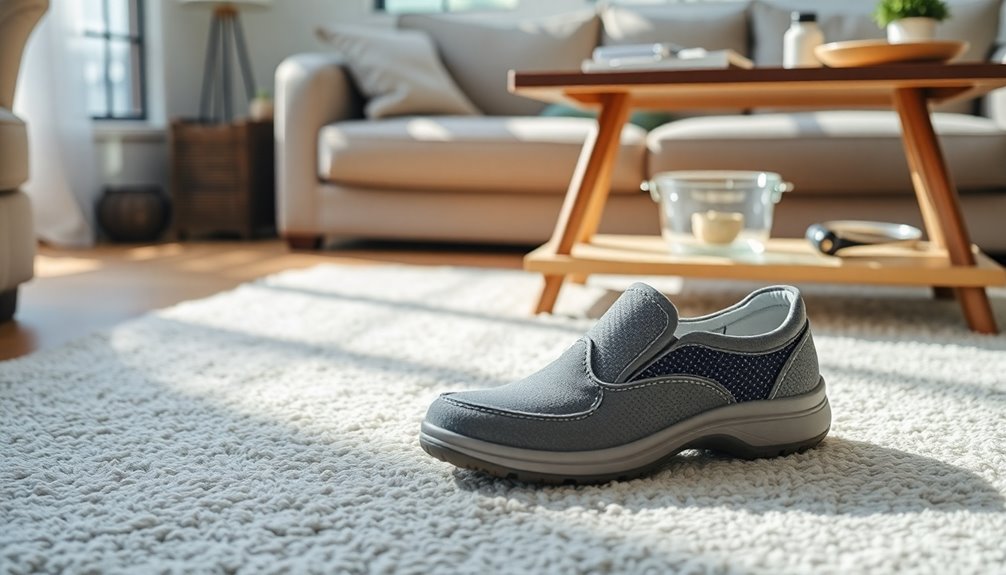
Caregiving often demands long hours on your feet, making comfortable, non-slip footwear an essential part of your daily routine. When you invest in quality footwear, you enhance your safety and well-being, greatly reducing fatigue and the risk of slips and falls.
Ergonomic designs provide the support you need to assist your loved ones effectively while keeping you comfortable. Non-slip soles are important in environments where spills are common, giving you the traction necessary to maintain stability.
Many stylish options blend safety features with aesthetics, allowing you to express your personal style. As a family caregiver, choosing the right footwear is critical for both your comfort and the security of those in your care.
Protective Gear
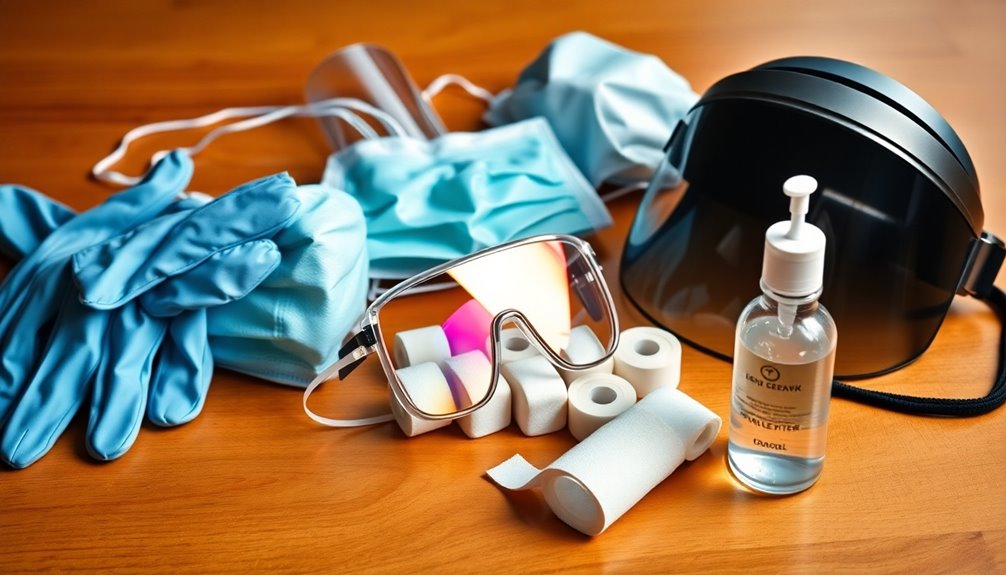
When you're caring for others, protective gear is a must-have for your safety and hygiene. Using gloves, masks, and waterproof aprons not only safeguards you but also creates a healthier environment for those receiving care. Plus, investing in this essential equipment can save you money by prolonging the life of your clothing. Additionally, maintaining optimal performance of air purifiers can further enhance the air quality in caregiving settings. By using air purifiers with HEPA filtration, you can effectively remove allergens and pollutants, ensuring a safer atmosphere for both caregivers and those in their care. Furthermore, incorporating smart features in air purifiers can allow for real-time monitoring and adjustment based on air quality needs.
Essential Safety Equipment
As you navigate the challenges of caregiving, having the right essential safety equipment is essential to protect both you and the individual in your care.
Protective gear like gloves and masks helps prevent direct contact with bodily fluids, reducing the risk of spreading infections. Waterproof aprons add an extra layer of protection, keeping your clothing safe from spills during tasks that may involve hazardous materials.
Non-slip footwear is key for maintaining stability and preventing falls, especially during those long hours on your feet. Affordable protective gear not only safeguards you but also cuts down on clothing replacement costs.
Regularly updating and maintaining this gear guarantees you're always ready to handle emergencies and daily tasks safely and effectively as you care for your loved ones. Additionally, understanding the importance of regular maintenance can help ensure your protective gear remains effective over time.
Hygiene Protection Importance
Maintaining proper hygiene in caregiving is essential, especially since you're often in close contact with individuals who may be vulnerable to infections.
Using protective gear, like gloves and masks, helps prevent direct contact with bodily fluids and reduces the spread of germs. Waterproof aprons are also imperative, as they shield your clothing from spills, keeping you looking professional while extending the life of your garments.
By prioritizing hygiene protection, you greatly lower the risk of infections among caregivers, which is critical when working with the elderly or immunocompromised individuals. Regular dental check-ups are also vital, as they can help identify any potential health issues early on.
Affordable protective equipment guarantees you can uphold these hygiene standards without breaking the bank, ultimately safeguarding both your health and the well-being of those you care for.
Cost-Effective Solutions
While caring for someone, you might worry about the costs associated with protective gear, but there are plenty of budget-friendly solutions available.
Investing in cost-effective solutions like gloves, masks, and waterproof aprons can greatly reduce your expenses. These items protect you from bodily fluids and germs, minimizing the risk of infections for both caregivers and loved ones.
Waterproof aprons, in particular, safeguard your clothing from spills, prolonging garment life and maintaining a professional appearance. Plus, buying protective gear in bulk can lead to discounts, ensuring you're always stocked up.
Regular use of these items boosts your confidence, allowing you to focus on providing quality care without the stress of contamination. Additionally, maintaining a clean environment reduces allergens and pollutants, which is essential for the health of both caregivers and those they care for.
Back Support Belt

A back support belt can make a real difference in your caregiving routine by alleviating lower back strain.
It enhances your stability while lifting, reducing the risk of injury during those demanding tasks.
Alleviates Lower Back Strain
When you're lifting or transferring loved ones, using a back support belt can make a significant difference in reducing lower back strain.
These belts offer essential support, improving weight distribution and stability, which helps reduce stress on your back during caregiving tasks. Many caregivers who assist older adults report a noticeable decrease in back pain symptoms after incorporating a support belt into their daily routines.
Properly fitted back support belts also encourage good posture while lifting, further protecting your spine from injury.
By enhancing comfort and efficiency, you'll find it easier to perform your loved ones care duties for longer periods without fatigue.
Prioritizing your well-being is key to providing the best care possible.
Enhances Caregiver Stability
Using a back support belt not only helps alleviate lower back strain but also greatly enhances caregiver stability.
You'll find that these belts distribute weight evenly, making your caregiving tasks more efficient and comfortable.
Research shows that caregivers using these belts report lower chronic back pain and improved job satisfaction, which ultimately boosts your quality of life.
- Provides necessary support while lifting or transferring
- Reduces fatigue during long caregiving shifts
- Allows for more extended periods of effective care
- Enhances confidence in movements
- Supports healthcare professionals in managing physical demands
Investing in a back support belt helps you maintain your health and effectiveness, allowing you to provide the best care for your loved ones.
Reduces Injury Risks
Although caregiving can be physically demanding, wearing a back support belt greatly reduces your injury risks. This tool provides added stability and weight distribution, helping prevent lower back strain when lifting or transferring your loved ones.
Studies show that caregivers like you experience markedly less back pain and discomfort while using these belts. By reducing the risk of injury, you can perform your care services more efficiently and without the fear of physical harm.
Many back support belts feature ergonomic designs, allowing you to wear them comfortably for longer periods. Regular use not only improves your posture but also decreases muscle fatigue, contributing to your overall well-being as you care for the health of your loved ones.
Educational Resources

To provide the best care possible, you need access to quality educational resources that equip you with essential knowledge about medical conditions and effective caregiving techniques. By understanding small mistakes in caregiving, you can improve your approach and foster better relationships with those you care for.
These resources can empower you as a caregiver, making your experience smoother and less stressful. Consider these options:
- Books like "The 36-Hour Day" for dementia care
- Online courses from platforms like Coursera and Udemy
- Workshops that offer hands-on training
- Support groups for emotional guidance
- Websites with practical advice tailored for caregivers
Incorporating emotional support into your caregiving routine can greatly enhance your skills, reduce stress, and improve the overall quality of care you provide. Additionally, understanding emotional dysregulation can help caregivers navigate challenging situations more effectively.
When you're informed, both you and your loved ones can enjoy better health outcomes.
Emergency Contact List
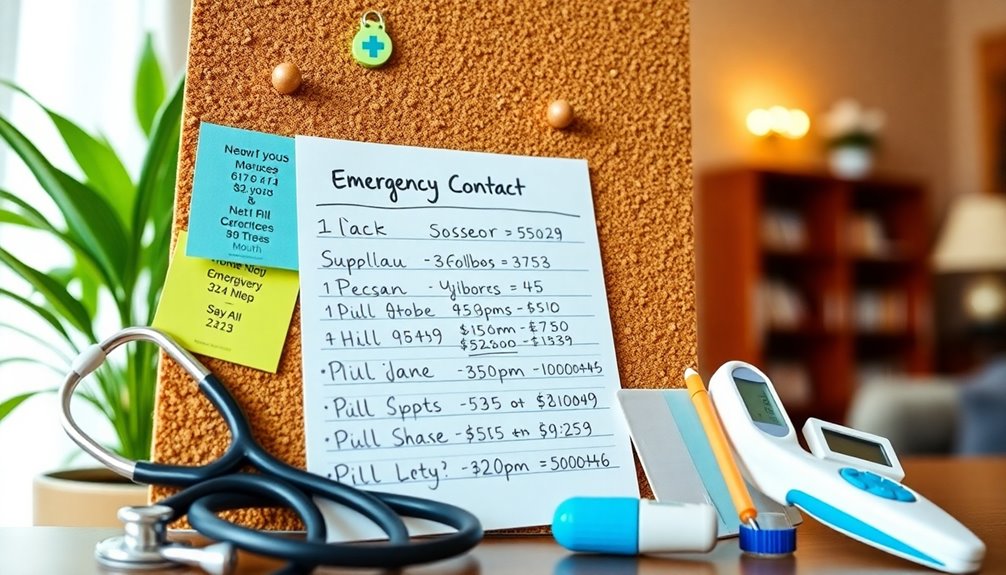
As a caregiver, being prepared for emergencies is just as important as having the right educational resources.
An emergency contact list is essential for quick access to support during urgent situations. Make sure to include family, friends, neighbors, and healthcare providers on this list, along with important contact numbers.
It's critical to keep this list accessible and up-to-date, incorporating details like your loved one's medical history and current medications. This information can greatly enhance communication during emergencies, especially when heading to the emergency room.
Regularly reviewing and updating the list can help avoid delays in contacting the right individuals.
Consider creating a digital version for easy access and sharing, particularly during telehealth appointments or when you're on the go.
First Aid Kit
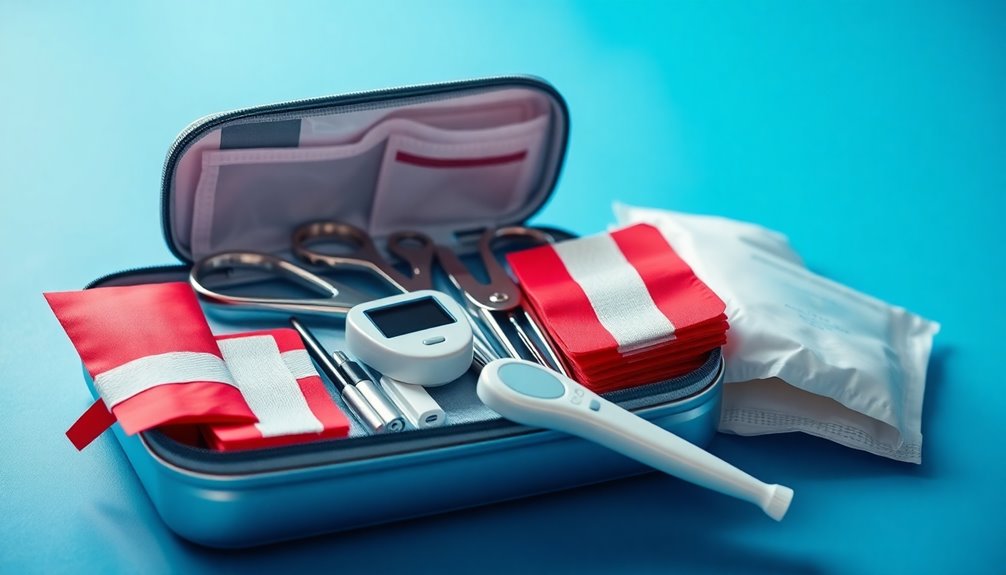
Having a well-stocked first aid kit is vital for any caregiver, as it enables you to address minor injuries and medical situations quickly.
You can't always predict when an emergency will arise, so being prepared is key. Regularly check and replenish your first aid kit to guarantee all items are fresh and ready for use.
Consider including specialized items based on health needs, such as:
- Adhesive bandages
- Sterile gauze pads
- Antiseptic wipes
- Pain relievers
- Glucose tablets
Keeping a first aid kit easily accessible provides peace of mind and helps reduce the severity of injuries.
Personal Health Items

While caring for others, it's easy to overlook your own health needs, but using personal health items is essential for maintaining your well-being. Hand sanitizers and disinfectant wipes are vital for preventing infections, especially when caring for seniors with compromised immune systems. Additionally, understanding the importance of preventative measures can further enhance your ability to stay healthy while caregiving. Regular exercise can also be beneficial, as studies show improved physical activity can promote emotional well-being in caregivers.
Frequent handwashing can lead to skin irritation, so don't forget to use moisturizers to keep your skin healthy and comfortable. Regular medical checkups, along with vitamins and supplements, guarantee you stay in top shape. Incorporating effective relaxation techniques can also help manage stress levels during caregiving.
Carrying these personal health items can greatly lower your risk of illness, with families reporting 60% fewer infections. Prioritizing self-care through these tools helps you remain resilient while managing caregiving responsibilities, ensuring you're fit to provide the best care possible.
Support Network Information
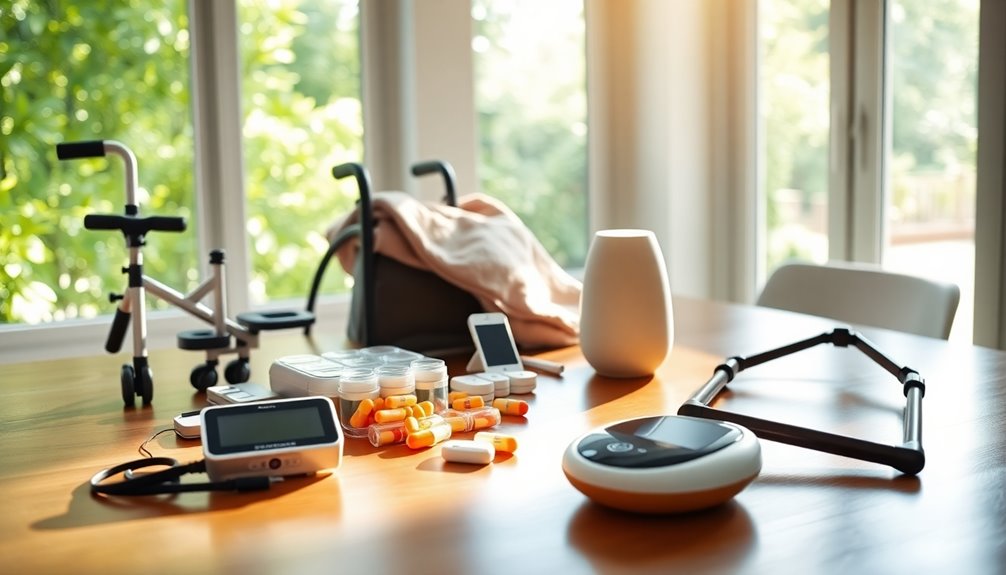
Building a support network is essential for caregivers, since it offers the emotional, physical, and mental assistance needed during challenging times. Connecting with family members, friends, and fellow caregivers can alleviate feelings of isolation and enhance your coping strategies.
Here are some key components to reflect upon for your support network:
- Local and online support groups
- Family members who can share caregiving duties
- Friends who provide emotional support
- Professional counselors or therapists
- Community resources and services
Digital Devices
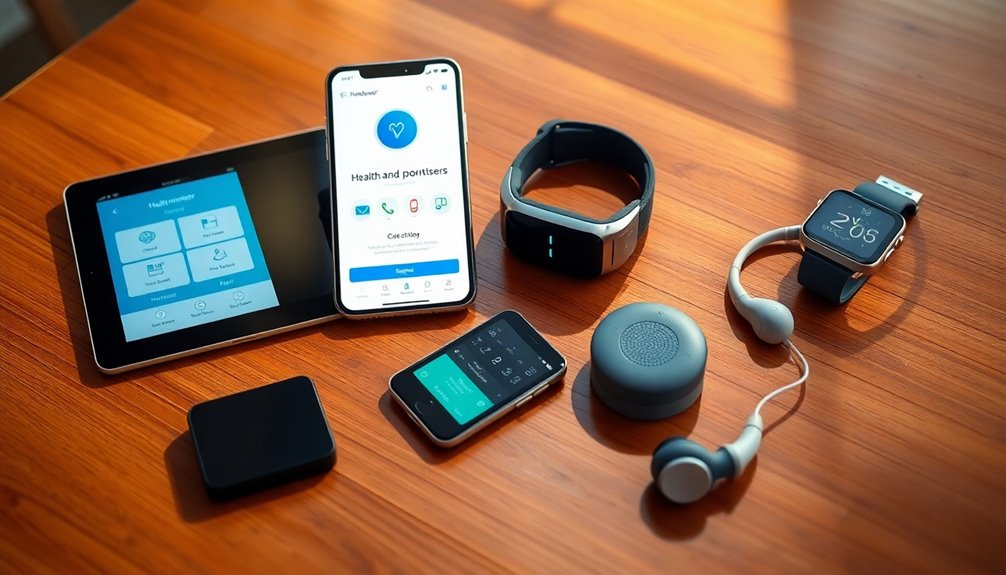
Digital devices are game-changers for caregivers like you.
With essential caregiving apps, remote monitoring technology, and the convenience of telehealth, managing your loved one's care has never been easier. These tools not only streamline tasks but also enhance communication with healthcare providers, keeping you connected and informed. Furthermore, the integration of intelligent tutoring systems can provide personalized support for caregiving challenges, making it easier to adapt to individual needs. Additionally, utilizing emergency funds can help ensure financial stability while addressing unexpected caregiving expenses. It's also crucial to understand the importance of clear communication when discussing end-of-life care preferences with your loved ones.
Essential Caregiving Apps
As you navigate the challenges of caregiving, essential apps can be invaluable tools that streamline your daily tasks and improve your loved one's care.
These caregiving apps offer numerous features that are beneficial for both patients and caregivers, making your life easier.
Here are some key features to look for:
- Task organization and to-do lists
- Appointment scheduling and medication reminders
- Progress tracking for health management
- Family communication and updates sharing
- Educational resources and caregiving tips
Remote Monitoring Technology
Caregiving apps lay the groundwork for effective management, but remote monitoring technology takes it a step further by providing real-time insights into your loved one's health.
With wearable health trackers, you can continuously monitor crucial signs like heart rate and blood pressure, enabling you to track health metrics effortlessly. These devices send alerts if abnormal readings are detected, allowing for timely interventions and potentially reducing emergencies.
Plus, many systems integrate with your smartphone or tablet, giving you access to health data from anywhere. By monitoring activity levels and sleep patterns, you gain a fuller picture of well-being.
This proactive approach to healthcare management empowers you to adjust care plans based on real-time data, ultimately improving outcomes for those you care for.
Telehealth Convenience Benefits
While juggling various responsibilities, you can greatly benefit from the convenience of telehealth services. These platforms make managing health easier for caregivers by connecting you with healthcare professionals without the hassle of physical visits.
Check out these benefits:
- Reduced travel costs and time
- Higher satisfaction rates from patients
- Secure messaging for efficient communication
- Insurance coverage for many services
- Flexible scheduling around caregiving duties
With telehealth, you can schedule video consultations that fit your busy life, ensuring your loved one's health needs are addressed promptly.
Plus, you'll enjoy the accessibility of care from the comfort of home. Embracing telehealth not only enhances your caregiving experience but also promotes better health management for those you care for.
Frequently Asked Questions
Why Do We Need Caregiving Tools?
You need caregiving tools because they simplify your responsibilities and enhance the care you provide.
By centralizing medical information and schedules, you can manage your care recipient's needs more efficiently. These tools also improve safety through protective gear and medication management, reducing the risk of accidents.
Plus, they help alleviate stress by keeping you organized and informed, allowing you to focus on delivering quality care instead of getting overwhelmed by logistics.
What Is the Most Important Thing for Caregiving?
The most important thing for caregiving is effective communication. When you communicate openly with those you care for, you build trust and guarantee everyone's on the same page regarding health needs and preferences.
It's vital to listen actively and express your thoughts clearly. This connection not only enhances the care experience but also fosters a supportive environment where both you and the person receiving care feel understood and valued.
What Do Caregivers Really Need?
Caregivers really need a solid support system, streamlined scheduling, and safety supplies.
Start with a Caregiver Journal to keep track of medications and appointments. Comfortable, non-slip footwear helps you stay steady during long hours.
Don't forget a first aid kit for minor mishaps. Incorporating medication management software guarantees you never miss a dose.
Building a support network brings you companionship and coping strategies, making your journey a little easier and more fulfilling.
What Are the 5 Caregiving Tools Equipment and Paraphernalia Used in Meal Preparation?
When it comes to meal preparation, you'll find several essential tools can make a real difference.
Adaptive utensils help you or your loved one maintain independence with ease. Non-slip cutting boards guarantee safety while chopping. A food processor quickly handles various ingredients, saving time.
Microwaveable containers let you reheat meals safely, and measuring cups with clear markings guarantee accurate portions.
These tools simplify cooking and enhance the overall experience for everyone involved.
Conclusion
Incorporating these must-have caregiving tools can truly transform your daily routine. Imagine using a caregiver journal to track your loved one's medications and appointments, giving you peace of mind as you juggle various responsibilities. With a comfortable pair of non-slip shoes, you'll feel secure while maneuvering your home, helping you stay focused on providing care. By equipping yourself with the right resources, you'll not only enhance your caregiving experience but also guarantee your loved one's well-being.
